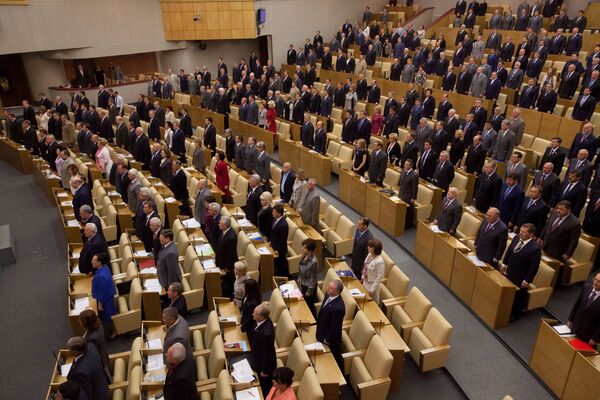The lower chamber of the Russian parliament, the State Duma, unanimously approved a new law on Friday which should make it much easier to set up and officially register political parties.
The new bill was welcomed by members of the existing political establishment, but criticized by small parties outside the Duma.
Under the draft law, which President Dmitry Medvedev submitted to parliament in December, new parties will only require a minimum of 500 members to be registered, a huge drop from the 45,000-member threshold currently in force.
The new law also frees all parties from the necessity to collect voter signatures as a prerequisite for standing in all elections, except the presidential poll. Currently, only parliamentary parties are exempt from this obligation.
The amendments are part of President Medvedev’s political reforms announced at the end of last year, which also reintroduce direct elections for governors, scrapped in 2004 by then-President Vladimir Putin.
Parliamentary factions as well as non-parliamentary parties and representatives of the national opposition also took part in the debate on the new draft law. All of the parties represented in parliament welcomed its adoption, saying it will make the political system more competitive, but is unlikely to bring lots of new faces into the Duma.
Ruling United Russia party members said the new law boosts democracy. “It will bolster improvements in the country’s political system, will help involve new active people to the political process,” Duma Deputy Speaker and United Russia member Sergei Neverov said.
The leader of United Russia’s parliamentary group Andrey Vorobyov also welcomed the new law, claiming it made the political system open to almost everyone. “Each citizen of our country… is now welcome!”
The Communist Party Duma deputies' leader Anatoly Lokot said his party supported the law as it “liberalizes the political system.” “We voted for it as we are not afraid of rivalry. We are self-confident… 12 million people voted for us,” he said noting that the law also brings several potential problems, such as the possible emergence of phantom parties.
Liberal Democratic Party leader Vladimir Zhirinovsky was also positive. “Thousands of parties will arise. We approve of it.. but only some seven parties will be in fact able to pass the five percent barrier [needed to enter the lower house of parliament].”
But the parties which do not currently have seats in parliament spoke out against the new law.
“Could we call this draft a victory in a general sense? No, we can’t, since other laws ban the establishment of electoral blocs,” Yabloko party leader Sergei Mitrokhin said.
The law “broadens the political space,” Right Cause leader Andrey Dunayev said. “But will it make the political system more effective? I guess not, scores of parties will emerge, which will bring scores of manipulations, and this is a serious threat.”
Leader of the unregistered Parnas party Boris Nemtsov harshly criticized the law. “Voters will howl over this mad number of parties [which will emerge after the law’s adoption], they will hate the system, and we do not want to have a hand in it.”
Deputies agreed the law will come into effect earlier than was proposed in the first draft. An amendment was passed saying that the bill will come in force immediately after publication and not on January 1, 2013 as initially planned.




